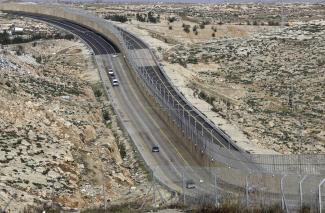International law
A new book examines the charge of apartheid against Israel
 picture-alliance/AP Photo/Mahmoud Illean
Exclusively Israeli: segregated highway with a security wall in the West Bank.
picture-alliance/AP Photo/Mahmoud Illean
Exclusively Israeli: segregated highway with a security wall in the West Bank.
Few topics have been debated so bitterly in recent years as the accusations of apartheid levelled against Israel by Amnesty International, Human Rights Watch and the Israeli civil-society organisations Yesh Din, B’Tselem and Kerem Navot. At issue are various forms of systematic discrimination against Palestinians in the occupied territories, Israeli-annexed East Jerusalem and Israel itself.
The apartheid question is not new. As early as the 1960s, Palestinian intellectuals were concerned with possible apartheid structures in the Palestinian territories. They quickly met with the approval of the African National Congress, which was fighting racial segregation in South Africa at the time and now is that country’s dominant political party.
Ambos, who specialises in international criminal law, has taken up the issue in a new book, assessing the situation in the West Bank. He warns that the charge of apartheid should not be levelled casually, but only after thorough, unbiased scrutiny and even then with caution. Nonetheless, he advises Israel to take the accusation seriously. Solving the Middle East conflict in line with international law, after all, is essential to Israel’s long-term security.
Before Ambos turns his attention to the West Bank, he explains the legal framework and discusses the prohibition against apartheid under international law. He concludes that a state can indeed commit the crime of apartheid in occupied territories beyond its national orders.
International accusations
After a comprehensive survey of the history of apartheid in South Africa, Ambos addresses the international accusations of apartheid against Israel. In his concluding report of 2022, Michael Lynk, a Canadian law professor who served as UN Special Rapporteur on the situation of human rights in the Palestinian Territory, states bluntly: “This is apartheid”. According to Lynk, apartheid in the Palestinian territories does not have entirely the same characteristics as it had in South Africa. However, he calls attention to some “pitiless features of the ‘apartness’ rule by Israel” that go beyond what happened in South Africa. He points out segregated highways, high walls and extensive checkpoints that isolate the Palestinian people from the outside world. He also finds fault with civilians being exposed to missile strikes and tank shelling. Finally, he finds it problematic that Israel has left it to the international community to take care of Palestinians’ humanitarian needs and social welfare.
Ambos also examines the arguments of those who disagree with the apartheid claim. He primarily cites the Israeli organisation “NGO Monitor”. In broad agreement with the Israeli government, this organisation firmly rejects the charge. NGO Monitor called the UN report “Michael Lynk’s final fiction”, which allegedly contained many “falsehoods and distortions”.
In the third section of his analysis, Ambos applies the legal apartheid norms to the occupied West Bank. Even after a thorough investigation, he finds it difficult to draw a “definitive” conclusion. In his eyes, it ultimately depends “on the circumstances of the individual case whether the charge of apartheid can hold up against a particular defendant before an independent court”.
Ambos’ analysis shows that it is possible to objectively examine charges of apartheid. However, it also demonstrates that the term remains quite vague. Thus far, only two former apartheid-era security officers have been charged with apartheid-related crimes against humanity in South Africa in 2021.
Things may change soon, however. In 2022, the UN General Assembly tasked the International Court of Justice with filing a comprehensive report on the Israeli occupation. This report will also address the accusations of apartheid.
Reference
Ambos, K., 2024: Apartheid in Palästina? Frankfurt, Westend Verlag (only available in German).
Kim Berg belongs to the editorial team of the communications agency Fazit.
kim.berg@fazit.de


